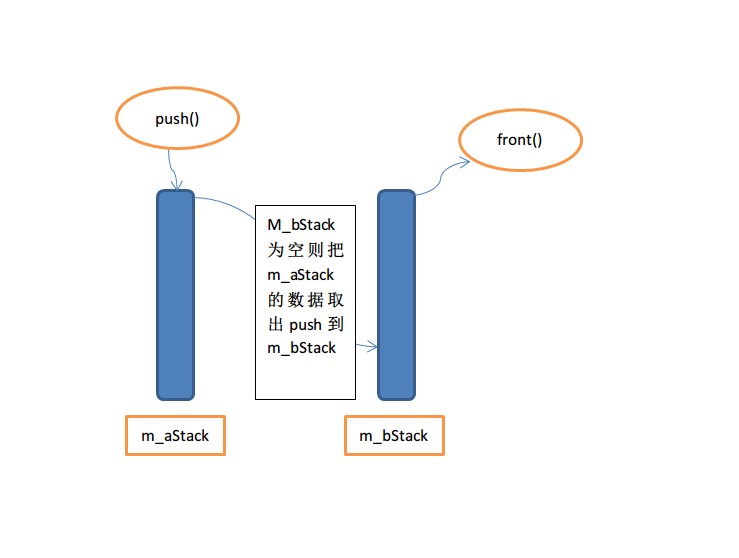每天一个小算法(6)---- 通过两个栈实现一个队列
这个算法也很简单,定义两个栈m_aStack、m_bStack,m_aStack负责push()数据,m_bStack负责front()数据。
思路:每一次front()取数据都会检查一下m_bStack是否为空,为空则把m_aStack的所有数据pop()出来push()到m_bStack中。

因为STL里有stack,直接拿来用了,代码使用C++,在linux/g++下编译运行成功:

1 #include <stack> 2 #include <stdio.h> 3 #include <stdlib.h> 4 #include <time.h> 5 6 class Fifo 7 { 8 public: 9 const int size() const; 10 const bool empty() const; 11 const int front(); 12 void push(int element); 13 void print() const; 14 private: 15 std::stack<int> m_aStack; 16 std::stack<int> m_bStack; 17 }; 18 19 const int Fifo::size() const 20 { 21 return m_aStack.size() + m_bStack.size(); 22 } 23 24 const bool Fifo::empty() const 25 { 26 return m_aStack.empty() & m_bStack.empty(); 27 } 28 29 const int Fifo::front() 30 { 31 if( empty() ) 32 return 0; 33 34 if ( m_bStack.empty() ) 35 { 36 while ( !m_aStack.empty() ) 37 { 38 m_bStack.push(m_aStack.top()); 39 m_aStack.pop(); 40 } 41 } 42 43 int tmp = m_bStack.top(); 44 m_bStack.pop(); 45 return tmp; 46 } 47 48 void Fifo::push(int element) 49 { 50 m_aStack.push(element); 51 } 52 53 void Fifo::print() const 54 { 55 if ( empty() ) 56 return; 57 58 std::stack<int> tAStack = m_aStack; 59 std::stack<int> tBStack = m_bStack; 60 61 printf("the elements of the m_aStack:\t"); 62 while ( !tAStack.empty() ) 63 { 64 printf("%d ", tAStack.top()); 65 tAStack.pop(); 66 } 67 printf("\n"); 68 69 printf("the elements of the m_bStack:\t"); 70 while ( !tBStack.empty() ) 71 { 72 printf("%d ", tBStack.top()); 73 tBStack.pop(); 74 } 75 printf("\n"); 76 77 } 78 79 int main(int argc, char const *argv[]) 80 { 81 Fifo fifo; 82 srand((int)time(0)); 83 for ( int i=0; i< 100; ++i ) 84 { 85 if ( (rand() & 1) == 0 ) 86 { 87 int tmp = rand()%100; 88 printf("\npush %d to fifo\n", tmp); 89 fifo.push(tmp); 90 fifo.print(); 91 } 92 else 93 { 94 printf("\nthe front of the fifo: %d\n", fifo.front()); 95 fifo.print(); 96 } 97 } 98 99 return 0; 100 }





 浙公网安备 33010602011771号
浙公网安备 33010602011771号